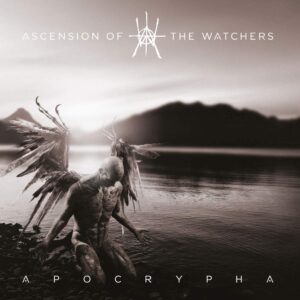
Active since 2001, Ascension of the Watchers is the result of a collaboration between former Fear Factory vocalist Burton C. Bell and John Bechdel (Ministry, Fear Factory, Killing Joke). Following on from the 2004, self-released demo, Iconoclast, the band released the well-received Numinosum via Al Jourgensen’s 13th Planet Records. In 2018, Bell announced that the next album would be produced by Jayce Lewis (Gary Numan) and the result is Apocrypha, an eleven-track album that eschews the brutality of Fear Factory for gothic soundscapes and eerie ambience.
It begins with the shimmery synth of Ghost Heart, a fusion of hypnotic post-punk via The Cure, Fear factory-esque crunch and Gary Numan’s atmospheric melodies. For those looking for Fear Factory comparisons (and such are inevitable, if not always warranted), the much-maligned Transgression certainly pointed in this direction with its emphasis firmly on texture and depth – and the music certainly suits the clean tones Burton employs here. The vibe is maintained on the mid-tempo The End Is Always The Beginning, which feels like the soundtrack to a long lost sci-fi movie. A darker piece, thanks to Burton harmonising in the minor key, it places synths to the fore, with guitars adding colour and depth and the resulting track feels hallucinatory rather than confrontational. Apocrypha builds over spidery synths, clean guitars and toms, all of which create a tribal pulse reminiscent of Killing Joke, especially in the way the cymbals are stripped out of the mix for the first two minutes. An album highlight, it’s a wonderfully understated piece of music that seems to evolve in front of you as it progresses across its seven-minute run time. In contrast, A Wolf Interlude, whilst still slow-paced, is built around a tougher, cleaner beat and the use of synth strings helps to bring out the strong melody of the chorus. Leaning heavily on vocal effects, Honore is the sound of HAL 9000 singing in the darkness, helplessly lost among the stars, and the melody is close to heart-breaking. It’s a very different piece of music to anything we’ve heard from Burton before, and although the vocal effects initially threaten to overshadow the piece, they emerge as an integral part of the atmosphere the band is attempting to evoke. Another highlight of the record is the raging instrumental Stormcrow (the album’s original projected title), which is pitched somewhere between Killing Joke and the hypnotic pulse of Great Annihilation-era Swans. A huge, rolling riff introduces the track before it slowly dissolves into something altogether more hypnotic and sinister. It’s easy to see why the band considered it for the title track, and it certainly stands out as a vibrant mid-album piece.
Kicking off the album’s second half with a sample, Cygnus Aeon sees the band employing clean tones, once again placing atmosphere ahead of aggression. It paves the way for Key To The Cosmos, which, as the title implies, is a spacey piece of music that once again sees a heavily harmonised Burton floating in space, observing the myriad dimensions that his beloved sci fi has to offer. The sense of wonder, however, gives way to darker reflection on the downbeat Bells Of Perdition, a haunting track that suggests there’s a long-standing sorrow at the heart of this music that cannot be erased. As such, Wanderers, makes a strange follow-up with its Adore-era Pumpkins vibe – all acoustic guitars and sweeping strings – and yet, Wanderers signals what is to come, with Sign Your Name adopting a similar feel. Once again leaning on Corgan’s trick of juxtaposing the most cruelly distorted lead work with acoustic rhythms, it offers a satisfyingly organic conclusion to the record.
Apocrypha is a strong album, but it is not perfect. At sixty-four minutes in length, and with only two tracks pitched under the five minute mark, songs have a tendency to meander and, because the tone is largely even (the heart-stopping Stormcrow proving the exception), the album can drag a touch in places, where tighter editing could have made for a more compelling whole. Equally, while the atmospheric nature of the music allows Burton to exercise his clean tones, there are parts where a touch more bite would really add to the overall ebb and flow, bringing more shade to the album’s light, and you find yourself wishing he’d let himself off the leash just a touch. That said, Apocrypha has much to recommend it. The musicianship and production is impressive and the ethereal nature of much of the music makes it a record to which the listener can drift away. Moreover, the gorgeous closing tracks (Wanderers and Sign Your Name) offer a compelling direction for the next album, leaving the listener wondering exactly where Burton’s travels will take him next. 7.5/10



